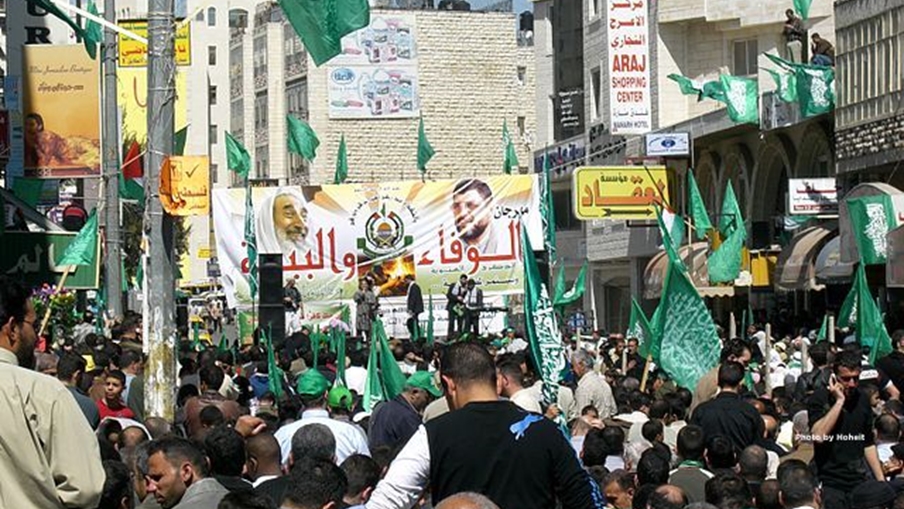The U.S. Treasury Department on Thursday imposed sanctions on four men responsible for moving tens of millions of dollars between Iran’s Islamic Revolutionary Guard Corps-Qods Force (IRGC-QF) and the Izz-Al-Din Al-Qassam Brigades, the operational arm of Hamas in Gaza.
The four men, based in Lebanon and Gaza, are critical intermediaries between the government of Iran, the Al-Qassam Brigades and end users in the West Bank, the Treasury said. Overall, in the past four years, the IRGC-QF transferred more than $200 million to the Al-Qassam Brigades, according to the Treasury.
“These facilitators funneled tens of millions of dollars from [IRGC-QF] through Hizballah in Lebanon to Hamas for terrorist attacks originating from the Gaza Strip,” said Treasury Under Secretary Sigal Mandelker.
Hamas was designated in October 1997 as a foreign terrorist organization (FTO). It was first listed for sanctions by the U.S. in 1995. The IRGC-QF and the Al-Qassam Brigades are also designated FTOs and sanctioned under several other U.S. authorities.
The sanctions were coordinated with Oman, according to the U.S. Treasury. They reflect “our determination to counter Iran’s malign influence and the financial, material, or technological support, or financial or other services to or in support of Hamas,” said Secretary of State Mike Pompeo.
Muhammad Sarur, a Lebanon-based financial operative sanctioned Thursday, is at the center of the scheme and has been identified as being in charge of all financial transfers between the IRGC-QF and the Al-Qassam Brigades, according to the Treasury. He has an extensive history at Bayt al-Mal, a Hizballah-controlled bank sanctioned in 2006, having been employed there between 2011 and 2016, the Treasury said. To transfer the funds to Hamas in Gaza, Sarur coordinated the transactions through an individual who served as a local financial facilitator and money smuggling operations officer, the Treasury said.
The other three sanctioned men, based in Gaza, have been integral to providing funding to the prisoner and martyrs infrastructure of Hamas in the West Bank and Gaza, the Treasury said.
Kamal Abdelrahman Aref Awad coordinated with the same facilitator used by Sarur to provide hundreds of thousands of dollars in deposits for Hamas, according to the Treasury. The Al-Qassam Brigades worked through Awad to distribute money to the families of martyrs in the West Bank, and he coordinated the mismanagement of certain Hamas prisoner entitlement funds, the Treasury said. Salih al-Aruri, a Hamas official sanctioned in 2015, relied on Awad for detailed information regarding Hamas prisoners and payments, according to the Treasury.
Fawaz Muhmud Ali Nasser and Muhammad Kamal al-Ayy worked together to transfer Iranian funds through Hizballah to Hamas and the Palestinian Islamic Jihad (PIJ), the Treasury said.
Nasser also managed funds related to Hamas prisoners, including those in Ofer, an Israeli facility located in the West Bank, the Treasury said. Al-Ayy worked with a Gaza-based facilitator to coordinate funds transfers to Hamas, the Treasury said. The Al-Qassam Brigades have identified al-Ayy as among the first mujahideen for Hamas; he was arrested multiple times, first at the age of 16, and last released in 2009, according to the Al-Qassam Brigades website. In his youth, al-Ayy was a driver for a senior Al-Qassam Brigades leader.
Awad and Nasser were released from prison as part of the Israel-Hamas swap involving Israeli soldier Gilad Shalit, according to their profiles on the Hamas website. The 2011 exchange involved the release of Shalit, who had been held for more than five years, for more than 1,000 Hamas and Al-Qassam Brigades prisoners.
Analysts from the Counterterrorism/Middle East team contributed to this report.
